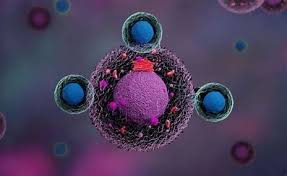04 November 2025 | Tuesday | Reports

CARsgen Therapeutics Holdings Limited (Stock Code: 2171.HK), a company focused on developing innovative CAR T-cell therapies, announces clinical data for CT0596, an allogeneic BCMA-targeting CAR-T product candidate developed on its proprietary THANK-u Plus™ platform for relapsed/refractory multiple myeloma (R/R MM), and for CT1190B, an allogeneic CD19/CD20-targeting CAR-T product candidate for relapsed/refractory non-Hodgkin's lymphoma (R/R NHL). The data showed that both allogeneic CAR-T products demonstrated initially favorable safety profiles and encouraging efficacy signals.
Data for CT0596 in Relapsed/Refractory Multiple Myeloma
CT0596 is a BCMA-targeted allogeneic CAR-T cell therapy candidate developed based on CARsgen's THANK-u Plus™ platform and is currently being evaluated in an investigator-initiated trial (IIT) for malignant plasma cell neoplasms. The study has now entered the dose expansion phase with a determined lymphodepletion regimen. Future work will involve dose escalation of the cells to further determine the Recommended Dose (RD).
As of June 24, 2025, the reported clinical trial (NCT06718270) had enrolled 8 R/R MM patients who received CT0596 infusion from the dose-escalation phase. The median number of prior lines of therapy was 4.5 (range: 3-9). Five patients had prior exposure to triple-class drugs (PI, IMiD, and anti-CD38 monoclonal antibody), and five patients had a history of autologous stem cell transplantation. CAR-T cell doses administered were 1.5e8 (n=1), 3e8 (n=5), and 4.5e8 (n=2).
All 8 infused patients were evaluable for efficacy, with a median follow-up time of 2.56 months (range: 0.9-5.9 months). For lymphodepletion, 6 patients received fludarabine (30 mg/m²) and cyclophosphamide (500 mg/m²), while 2 patients received a reduced lymphodepletion dose. Five patients achieved partial response (PR) or above: 3 achieved complete response / stringent complete response (CR/sCR) (all of whom had received the full dose of lymphodepletion), 1 achieved PR, and 1 achieved very good partial response (VGPR). Six patients achieved minimal residual disease (MRD)-negativity at Week 4. No patients got progression disease. Pat 01 has ongoing sCR and MRD negative for nearly 6 months. CAR-T cell expansion was observed in all 8 patients. No dose-limiting toxicities (DLT), treatment discontinuations, or deaths were observed. Four patients experienced Grade 1 cytokine release syndrome (CRS), all of which resolved within 2-10 days.
Previously, in October 2025, CARsgen announced preliminary clinical data for CT0596 in relapsed/refractory primary plasma cell leukemia (pPCL). Two heavily pretreated pPCL patients with high disease burden and rapid progression both achieved sCR after receiving CT0596 treatment.
Data for CT1190B in Relapsed/Refractory Non-Hodgkin's Lymphoma
CT1190B is a CD19/CD20-targeted allogeneic CAR-T cell therapy candidate developed based on CARsgen's THANK-u Plus™ platform and is currently being evaluated in multiple IITs for indications including R/R NHL.
As of October 17, 2025, this reported clinical trials (NCT07053670, NCT06734871) had enrolled 14 patients, including 3 with follicular lymphoma (FL), 3 with mantle cell lymphoma (MCL), and 8 with diffuse large B-cell lymphoma (DLBCL). The dose escalation study has been completed, preliminarily determining the recommended lymphodepletion regimen and cell dose.
At the lymphodepletion dose of Fludarabine 30mg/m²×3 days + Cyclophosphamide 500mg/m²×3 days, all three FL patients achieved CR. One of these FL patients had failed immunochemotherapy, a PI3K inhibitor, chemotherapy + autologous hematopoietic stem cell transplantation, and CD3/CD20 bispecific antibody therapy; another FL patient had failed immunochemotherapy + autologous hematopoietic stem cell transplantation and CD19 CAR-T therapy. The peak copy number of expansion in these three patients reached 10³-10⁴ copies/µg gDNA.
At the lymphodepletion dose of Fludarabine 30mg/m²×3 days + Cyclophosphamide 1000mg/m²×2 days (the recommended lymphodepletion dose), 8 patients were enrolled, including 2 MCL patients (cell dose 6e8) and 6 DLBCL patients (cell dose 3e8: 1 patient; 4.5e8: 1 patient; 6e8: 4 patients). The details are below:
The primary safety signals of CT1190B were CRS, cytopenia, and infections. Other adverse reactions, such as immune effector cell-associated neurologic syndrome (ICANS) and graft versus host disease (GVHD) were not observed.
© 2026 Biopharma Boardroom. All Rights Reserved.